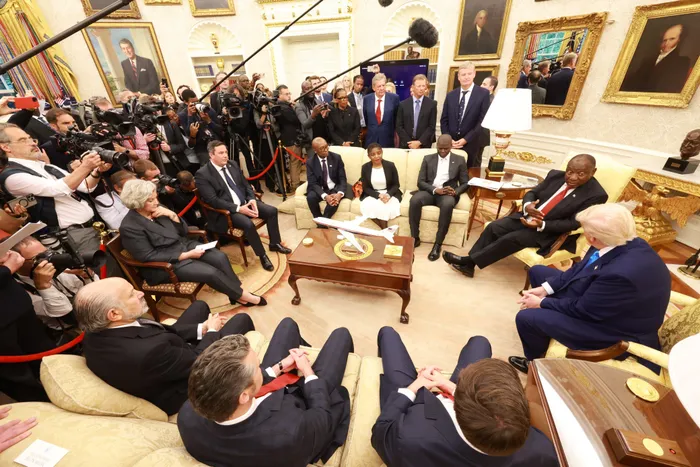Controversial resettlement of Afrikaners in the US sparks debate

The South African delegation led by President Cyril Ramaphosa with the US delegation and President Donald Trump at the White House
Image: GCIS
THE LATEST group of white Afrikaners, who are part of a broader plan to relocate about 8 000 in the ensuing months to the US, made their way to their new homeland on Friday.
Their move is a part of a controversial resettlement initiative initiated by former President Donald Trump, who cited concerns over alleged persecution and the spectre of "white genocide" in South Africa.
Jaco Kleynhans, head of Public Relations for the trade union Solidarity, revealed that the latest group included families with children and that efforts to secure future flights are already underway. “The second group departed on a commercial flight on Thursday and landed in Atlanta on Friday,” he confirmed. “Several more groups will follow in the coming weeks.”
The resettlement programme originated from Trump’s executive order issued in February, which highlighted the Expropriation Act 13 of 2024 as one enabling the alleged persecution of Afrikaners. The first group, numbering over 49 individuals, arrived last month aboard a chartered private plane, sparking major discussions around immigration, safety, and identity.
The US Embassy in Pretoria, in conjunction with the State Department, is currently processing the applications of thousands of Afrikaners, as reported by Kleynhans. “They are settling in southern states like Texas, North and South Carolina, Kansas, Oklahoma, and Nebraska,” he noted, highlighting the continuous flow of individuals seeking refuge from South Africa.
While Solidarity strives to guide prospective immigrants through the application process, Kleynhans maintained that the focus remains on ensuring a secure future for Afrikaners in their homeland. “We remain 100% convinced that South Africa must create a home for all its people,” he stated, adding that nearly 20% of Afrikaners have already left the country to escape unemployment and social unrest.
The ongoing migration has raised eyebrows, with some critics suggesting that the refugee initiative is politically charged. Kleynhans dismissed such claims, asserting that any shift in American policy could only occur through domestic electoral processes. “If Americans disagree with Trump on this, they can elect a different president in three years,” he said.
Kallie Kriel, CEO of AfriForum, expressed empathy for those departing, if not for the reasons prompting their emigration. He referenced the “hateful chants”, including the provocative phrase “Kill the Boer”, which he believes has exacerbated feelings of insecurity among Afrikaners. He emphasised the need for a broader conversation on inclusion and community safety, insisting that no demographic group should be targeted for violence.
International relations expert Dr Noluthando Phungula commented on the situation, suggesting that claims of white genocide seem to persist unchallenged within US policy discussions, potentially obscuring the reality many Afrikaners face. Professor Siphamandla Zondi from the University of Johannesburg shared a similar sentiment, forecasting an increasing number of people seeking a new life in the US as economic concerns continue to drive migration.
Meanwhile, the Department of International Relations and Cooperation has yet to acknowledge the latest arrivals, reflecting a significant gap between domestic perspectives and the unfolding narrative of current events.
As thousands await their future in America, the ongoing debate over the reasons for their exodus highlights the complex interplay of race, politics, and identity in a South Africa trying to reconcile its past. This resettlement move may serve as a bellwether for wider issues of acceptance and belonging for all South Africans.
DAILY NEWS
